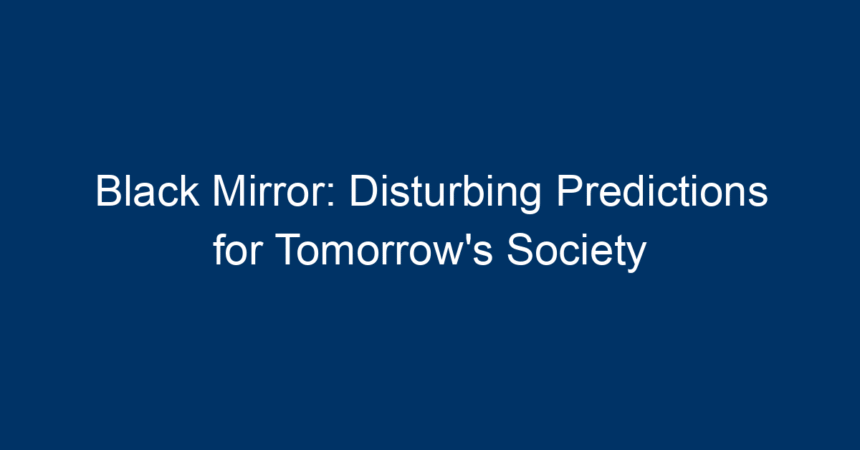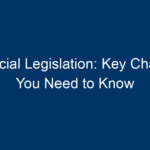Introduction
In a world increasingly dominated by technology, the British anthology series Black Mirror has captured the imagination and, often, the fears of its viewers. Created by Charlie Brooker, this thought-provoking show delves into the dark side of modern society, examining the unforeseen consequences of our technological advancements. Each episode serves as a standalone narrative, yet collectively they paint a chilling portrait of a near-future that feels alarmingly plausible. As we explore the predictions laid out in Black Mirror, we’ll examine their potential impact on our society, prompting crucial conversations about the direction of our world.
The Technological Dystopia
Surveillance and Privacy
One of the most jarring themes in Black Mirror is the invasion of privacy brought about by surveillance technologies. In episodes like "Nosedive," the quest for social validation leads individuals to live under constant scrutiny. Currently, we are witnessing the rise of ubiquitous surveillance—from CCTV cameras in public spaces to data tracking on social media. These technologies not only facilitate convenience but also creep into our private lives, raising ethical questions about privacy.
The implications of such technological integration are profound. As society becomes normalized to surveillance, we risk entering an era where personal freedom is compromised. The Black Mirror prediction that people might accept the loss of privacy for the sake of social status or convenience is alarmingly relevant today.
The Dangers of Social Media
Episodes like "Nosedive" and "Fifteen Million Merits" depict a disturbing future where social media dictates societal worth. The characters in these narratives obsess over likes and ratings, representing an extreme form of social validation that echoes our current reality. Today, platforms like Instagram and Twitter significantly influence public opinion and self-perception, often leading to anxiety and depression.
As social media evolves, the Black Mirror scenarios could become increasingly applicable. We need to ask ourselves: How do we safeguard mental health while navigating the pressures of social validation? Awareness campaigns and digital literacy programs could serve as solutions to mitigate these concerns.
The AI Takeover
Intelligent Machines
Black Mirror doesn’t shy away from the potential takeover by artificial intelligence. The episode "White Christmas" presents a chilling future where AI consciousness is used for torture, raising critical ethical concerns. Current advancements in AI are remarkable, but they also come with risks. As we develop intelligent machines, the question arises: How do we ensure ethical boundaries in AI programming?
The portrayal of AI in Black Mirror serves as both a warning and a guideline. As we move toward more advanced AI systems, society must engage in these discussions to prevent technologically-induced harm. Multidisciplinary approaches that include ethicists, technologists, and policymakers are crucial in shaping a future that respects human dignity.
Job Displacement
Another theme in Black Mirror is the fear of job displacement due to automation. The narrative in "Hated in the Nation" illustrates how technology can lead to community collapse and moral questioning. Automation is not a distant reality; it is happening now in industries like manufacturing and retail. The implications for the workforce are dire.
To counter this, society must focus on reskilling and upskilling the workforce. Education systems need to evolve to ensure that individuals are prepared for the jobs of the future. This proactive approach is essential to avert a dystopian scenario where people are left unemployed and disenfranchised.
The Ethics of Technology
The Moral Compass
In Black Mirror, the ethical dilemmas posed by technology often force characters into impossible choices, revealing humanity’s darker instincts. For instance, in the episode "Arkangel," a parent’s overreach into their child’s safety creates immense psychological repercussions. The real question is: What are the ethical boundaries we must not cross in the name of technological progress?
Currently, many societies grapple with these ethical dilemmas, especially in areas like genetic engineering and surveillance. Establishing a robust ethical framework is essential to guide the responsible use of technology. Public discourse is necessary to formulate these guidelines and ensure that technological growth doesn’t come at the expense of human values.
Relationships and Isolation
The episode "Be Right Back" explores the emotional toll of losing a loved one and the lengths a person might go to retrieve some semblance of that connection through technology. As technology reshapes how we communicate, there’s a growing concern about isolation and the quality of our relationships.
In today’s digital landscape, virtual interactions often replace face-to-face conversations, leading to a paradox of being connected yet isolated. We need to prioritize real-world connections to maintain the emotional well-being that technology cannot replace. Initiatives that foster community engagement and in-person networking are more important than ever.
The Environment and Climate Change
Climate Dystopia
Black Mirror frequently hints at environmental degradation and societal collapse as a consequence of our unchecked technological advancements. The episode "Fifteen Million Merits" not only critiques consumerism but also implies a dire future impacted by climate change.
As reports indicate a looming climate crisis, the urgency for sustainable technology is paramount. Investments in green technology and eco-friendly practices can help combat this impending disaster. Public awareness campaigns can encourage individuals to make conscious choices, embracing sustainability as a way of life.
Conclusion: An Actionable Path Forward
The predictions for tomorrow’s society explored in Black Mirror provide a crucial lens for understanding our current trajectory. While the series paints a bleak picture, it also serves as a catalyst for necessary discussions about the direction we are headed. Here are some actionable insights to consider:
-
Conscious Consumption: Administrate your media and tech usage mindfully. Be aware of how these platforms are influencing your perception and behavior.
-
Policy Advocacy: Advocate for policies that regulate technology, focusing on ethical implications and human rights.
-
Education and Reskilling: Support educational reform initiatives and community programs aimed at equipping future generations for upcoming job markets.
-
Engage in Discussions: Participate in public forums that address the ethical concerns surrounding technology. Open dialogue is essential for collective decision-making.
- Sustainable Practices: Promote and adopt sustainable practices in everyday life to combat climate change. Small actions can lead to significant change.
In a world increasingly shaped by technology, we have the power to steer our future away from the dystopian predictions of Black Mirror and towards a more harmonious coexistence with technological advancements. Let’s embrace the conversation and act responsibly to shape a better tomorrow.




